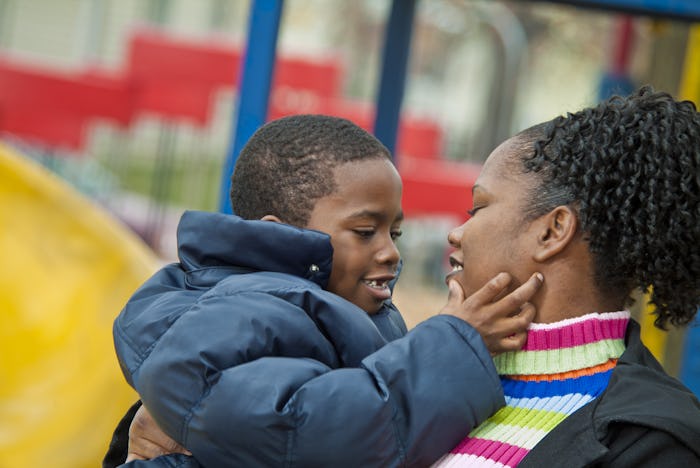Life

What Your Son Should Learn On Intl. Women's Day
Before there was Women's History Month there was Women's History Week, which started as an extension of International Women's Day. Celebrated on March 8 each year, this holiday is a great opportunity to share the accomplishments of women and explain women's rights to your kids. But getting down to the core of this good stuff isn't just for girls — spreading the word to young men is equally as important. As you're conversing with your kiddos this March 8, consider the things to teach your son on International Women's Day that will have the biggest impact.
Hopefully, your son's school will do their part during the month of March to share stories of women who've made an impact of society. But you can't rely completely on that to educate your little guy on this topic. Honoring this day means exploring all the different and meaningful pieces of the women's movement. Most importantly, this is an opportunity to show your son how he fits in, can make a difference, and affect change. You don't need a formal curriculum to provide an excellent lesson. You just need to speak from your heart about what you want your son to know about International Women's Day.
1Any Person, Of Any Age, Can Make A Difference
Sometimes it's hard for kids to relate to adults, so use examples of other kids who are doing big things. Share the story Malala Yousafzai, children's and women's rights activist and youngest recipient of the Nobel Peace Prize, with your son to show him that modern young women are making a big impact.
2Things Used To Be Different
To help your little guy understand the significance of International Women's Day, explain how things have changed for women over the years. Once he learns that women couldn't vote until the 1920s, he will start to gain perspective for the women's rights movement.
3It Takes A Village To Get Things Done
To help your son grasp the fact that this is not a polarizing day, have a discussion with him about his thoughts and opinions on women's issues, like equal pay, so he can see where he fits into the picture. Understanding that it takes more than just women to fight for these rights is a great lesson for a boy of any age.
4Stereotypes & Violence Are Wrong
Violence against women is a tough subject to navigate with younger kids, but with some thought and intention, can be done. As the website for International Women's Day suggested as part of their #BeBoldForChange campaign, educating boys about stereotypes and violence against women is an action anyone can take to promote gender equality. If you're not sure where to start, check out the website for White Ribbon, the world’s largest movement of men and boys working to end violence against women and girls.
5How Change Is Made
It's cool for kids to see how one small idea can blossom into something big. Share with your son how a group of women in California used the celebration of International Women's Day as a catalyst for Women's History Month, which has been nationally recognized since 1987.
6Support Comes In All Forms
If you want your son to understand how being a part of gender parity looks for him, teach all the ways he can support women. Patronizing women-owned businesses, treating women as equals, and speaking up when they see injustices are just a few ways you can explain support for women to your little guy.
7Women's Issues Are Global
Introduce your son to organizations, like Women For Women International, that sponsor women in developing countries to help them start a business that will change the lives of their family. You can even decide as a family to sponsor one of the women through their website.
8Women Are Diverse
Not your typical A, B, C book, Rad Women A - Z by Kate Schatz, will introduce your son to a diverse group of women throughout history in addition to 26 suggestions on how little readers can be rad too.
9How The Holiday Began
Most importantly, give the backstory to how this day began. As the website for the United Nations explained, "International Women's Day first emerged from the activities of labour movements at the turn of the 20th century in North America and across Europe." Once again, this explanation will also illustrate how activism can lead to positive social change.